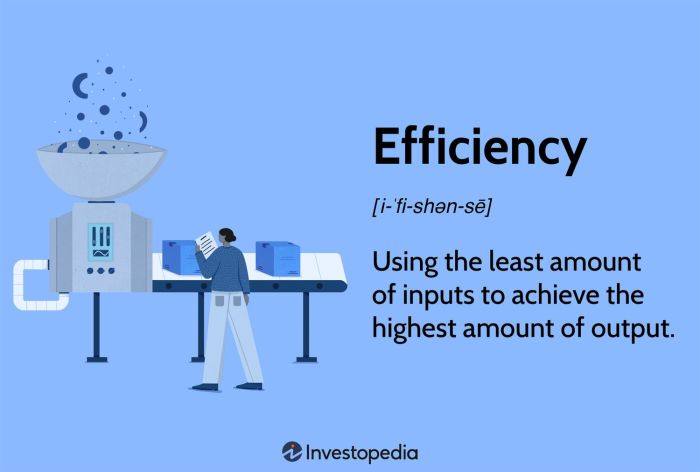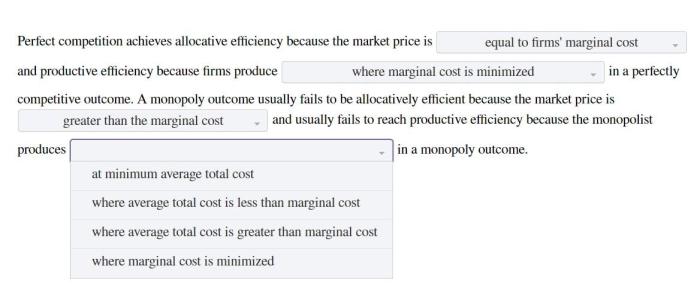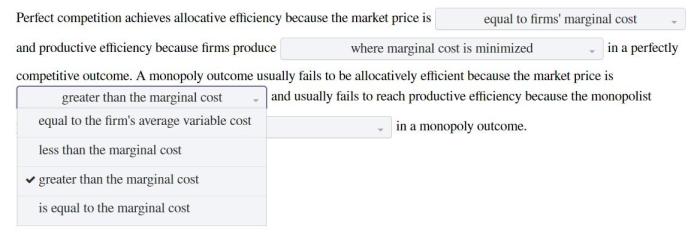Complete the statement on allocative and productive efficiency – As the discourse on allocative and productive efficiency takes center stage, this exploration delves into the intricacies of these economic concepts, their interconnectedness, and their profound impact on economic growth and development. Understanding the nuances of efficiency is paramount for policymakers, business leaders, and anyone seeking to optimize resource allocation and decision-making.
Allocative efficiency ensures that resources are distributed among different sectors and industries in a manner that maximizes overall societal welfare. Productive efficiency, on the other hand, focuses on maximizing output from a given set of inputs, leading to increased productivity and competitiveness.
By exploring the relationship between these two types of efficiency, we uncover strategies for promoting economic prosperity and sustainable development.
Allocative Efficiency

Allocative efficiency occurs when resources are allocated among different production processes in a way that maximizes the overall value of output. It ensures that the right resources are being used to produce the right goods and services in the right quantities, leading to an optimal allocation of resources.
For example, in a perfectly competitive market, allocative efficiency is achieved when the price of a good or service reflects its marginal cost of production. This ensures that consumers are willing to pay the full cost of producing the good or service, and producers are motivated to produce the quantity that consumers demand.
Role of Market Forces and Government Intervention
- Market forces, such as supply and demand, play a crucial role in promoting allocative efficiency by guiding resources to their most valuable uses.
- Government intervention can also be necessary to correct market failures and promote allocative efficiency. For example, taxes and subsidies can be used to encourage or discourage certain types of production.
Productive Efficiency: Complete The Statement On Allocative And Productive Efficiency

Productive efficiency refers to the ability of a firm or economy to produce the maximum possible output with a given set of inputs. It involves using resources in a way that minimizes waste and maximizes productivity.
Factors that contribute to productive efficiency include:
- Technology: Advanced technology allows firms to produce more output with the same or fewer inputs.
- Labor skills: A skilled workforce can produce more output per hour worked.
- Management practices: Efficient management practices can reduce waste and improve coordination, leading to higher productivity.
Impact on Productivity and Competitiveness
- Productive efficiency is essential for economic growth because it allows firms to produce more goods and services with the same or fewer resources.
- It also enhances competitiveness by reducing costs and improving the quality of products and services.
Relationship between Allocative and Productive Efficiency

Allocative and productive efficiency are interconnected and mutually reinforcing. Allocative efficiency ensures that resources are allocated to the most productive uses, while productive efficiency ensures that those resources are used in the most efficient manner.
Improvements in one type of efficiency can impact the other. For example, allocative efficiency can lead to higher productive efficiency by directing resources to more productive industries or firms.
Economic Policies, Complete the statement on allocative and productive efficiency
- Economic policies that promote competition, innovation, and investment can simultaneously promote both allocative and productive efficiency.
- For example, policies that encourage research and development can lead to new technologies that improve productive efficiency, while policies that reduce barriers to entry can increase competition and promote allocative efficiency.
FAQs
What is the significance of allocative efficiency?
Allocative efficiency ensures that resources are allocated to their most productive uses, maximizing overall societal welfare and consumer satisfaction.
How does productive efficiency contribute to economic growth?
Productive efficiency enables businesses to produce more output from the same inputs, leading to increased productivity, lower costs, and enhanced competitiveness.
What is the relationship between allocative and productive efficiency?
Allocative efficiency influences the distribution of resources, while productive efficiency focuses on maximizing output from those resources. Improvements in one type of efficiency can positively impact the other, leading to a virtuous cycle of economic growth.